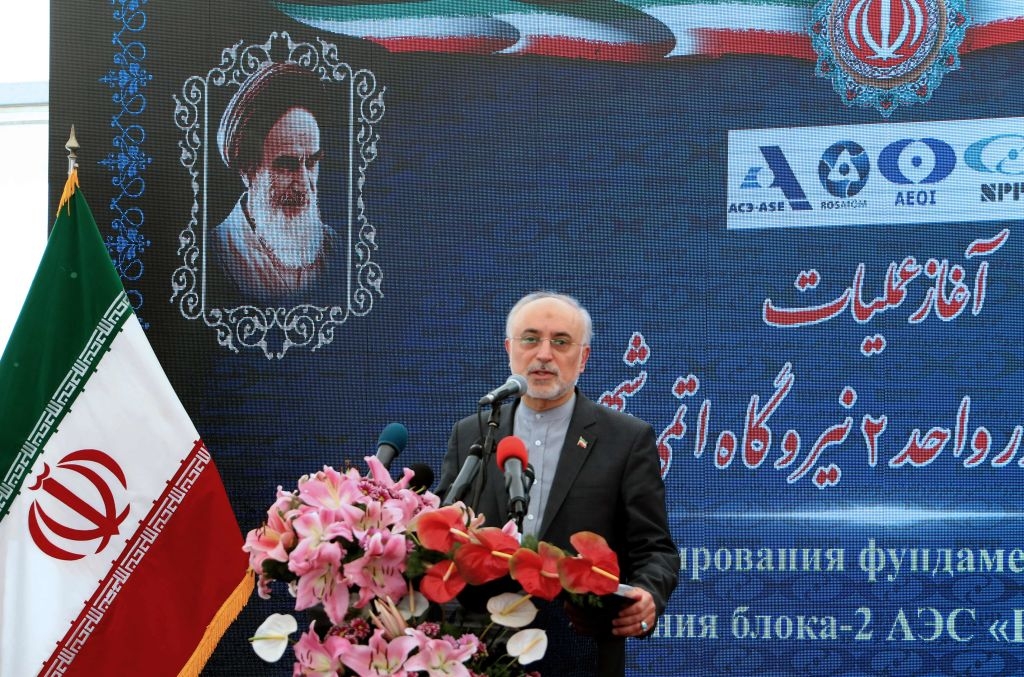 Believing that the ruling mullahs of Iran will halt their nuclear advancement with a deal is laughable. The 2015 nuclear deal required that the core of the Arak nuclear reactor would be filled with concrete and disabled. When asked about the video showing concrete being poured into the reactor's pipes to block them, Ali Akbar Salehi, former head of the Atomic Energy Organization of Iran responded: "[N]ot the pipes you see here. We had purchased similar pipes, but I couldn't announce it at that time.... We needed to be smart." Pictured: Salehi delivers a speech at the Bushehr power plant, on November 10, 2019. (Photo by Atta Kenare/AFP via Getty Images) |
The Biden administration has spent all its political capital to resurrect the nuclear deal -- presumably to perpetuate the idea that a nuclear agreement with the Iranian regime will stop Tehran from obtaining nuclear weapons. Unfortunately, believing that the ruling mullahs of Iran will halt their nuclear advancement with a deal is laughable.
The Iranian regime has even boasted about its shrewd policy of deceiving and misleading the international community during the previous nuclear deal. One of terms of the 2015 nuclear deal, for instance, was that the core of the Arak nuclear reactor would be filled with concrete and disabled. Iran, according to the country's Fars news agency, claimed that it had poured in the concrete and destroyed the reactor core. The US State Department, during the Obama-Biden administration, confirmed the move as well.
Later, however, Ali Akbar Salehi, the former head of the Atomic Energy Organization of Iran, openly admitted in an interview on Iran state television that the government had not complied with this requirement; instead, it had misled the international community: "For three years we have been saying we did not pour cement into the Arak heavy water reactor." When the regime's television host asked him about the video showing concrete being poured into the Arak reactor's pipes, Salehi responded:
"[N]ot the pipes you see here. We had purchased similar pipes, but I couldn't announce it at that time. Only one person knows so in Iran, the highest senior official. No one else knew. We needed to be smart. In addition, to not destroy the bridges behind us, we needed to also be building bridges, so that if we needed to return, we could return faster."
Other instances of deception include the detection of radioactive particles in Turquz Abad during the 2015 nuclear deal, and Iran's reluctance to answer simple questions posed by the International Atomic Energy Agency (IAEA) about Tehran's undeclared and secret facilities. In addition, during the deal, several reports, later proven to be accurate, warned that Iran was conducting secret nuclear activities. For example, Israel's then-Prime Minister Benjamin Netanyahu, pointed out in his speech to the UN General Assembly in 2018 that Iran had a "secret atomic warehouse for storing massive amounts of equipment and material from Iran's secret nuclear weapons program."
At the same time, two non-partisan organizations based in Washington, DC -- the Institute for Science and International Security (ISIS) and the Foundation for the Defense of Democracies (FDD) -- have released detailed reports about the fact that was Iran had undeclared clandestine nuclear facilities during the nuclear deal.
The Iranian regime was also supposed to restrict the amount of specific nuclear materials it possesses during the nuclear deal. According to a report by the IAEA, however, the ruling mullahs violated the deal by holding more heavy water, used for the production of nuclear weapons.
Now, thanks to the Biden administration's focus on reviving the nuclear deal and their apparent inability to see anything beyond the nuclear deal, the Iranian regime has bought time by dragging out the negotiations long enough to reach the nuclear threshold. Several high-ranking Iranian officials, including Iran's atomic energy chief, are currently bragging that the Islamic Republic has the ability to build a nuclear bomb. The Institute for Science and International Security released a study confirming this:
"Iran has enough enriched uranium hexafluoride (UF6) in the form of near 20 and 60 percent enriched uranium to produce enough weapon-grade uranium, taken here as 25 kg, for a single nuclear weapon in as little as three weeks. It could do so without using any of its stock of uranium enriched up to 5 percent as feedstock. The growth of Iran's stocks of near 20 and 60 percent enriched uranium has dangerously reduced breakout timelines."
Regrettably, it looks as though the Biden administration and Europe -- through their endless concessions and a staggering lack of deterrence -- are still trying to force-feed the world a hostile Iran, armed with nuclear weapons.
The mullahs rule over a country that the US Department of State has repeatedly called the world's top, leading or foremost sponsor of state terrorism (such as here, here and here).
One can only assume that the Biden administration is hoping to bribe the mullahs with up to a trillion dollars not to bomb Israel while he is still president. Meaning that afterwards would be splendid?
Not only are deals such as the Biden or Obama nuclear deal failing to halt the predatory regime of Iran from advancing its nuclear program and possessing nuclear weapons, it actually facilitates Iran's going nuclear by legitimizing its weapons.
Dr. Majid Rafizadeh is a business strategist and advisor, Harvard-educated scholar, political scientist, board member of Harvard International Review, and president of the International American Council on the Middle East. He has authored several books on Islam and US Foreign Policy. He can be reached at Dr.Rafizadeh@Post.Harvard.Edu


